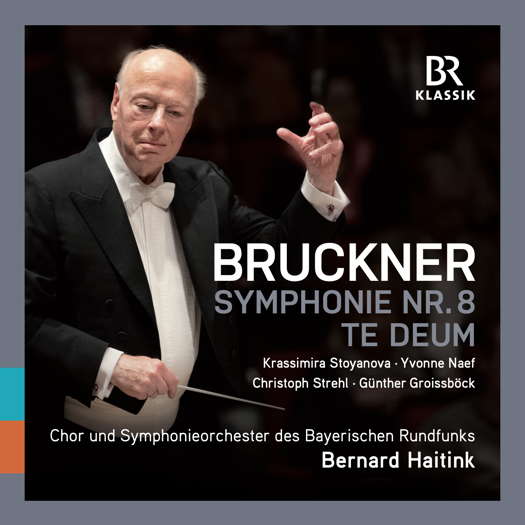 SPONSORED: Ensemble. A view from the pit - John Joubert's Jane Eyre, praised by Alice McVeigh.
SPONSORED: Ensemble. A view from the pit - John Joubert's Jane Eyre, praised by Alice McVeigh.
All sponsored features >>

Incandescent Music-making
GERALD FENECH urges you not to miss Haitink's recordings of Bruckner's Te Deum and Eighth Symphony
'Awesome in every way.'
Anton Bruckner (1824-1896) started composing his Te Deum in May 1881 while he was finishing his Sixth Symphony. He then set to work on the Seventh. After completing it, he took up the Te Deum again at the end of September, completing it in March 1884. Hans Richter conducted the premiere on 10 January 1886 with the Vienna Singverein in the Musikvereinssaal. Gustav Mahler was much taken with the work; in his copy of the score he replaced the subtitle 'for choir, soloists, orchestra and organ "ad libitum"' with 'for the tongues of angels, seekers of God, chastened hearts and souls purified by fire'.
Bruckner described the Te Deum as the 'pride of his life', writing:
If the good Lord ever calls me to him and asks me what I did with the talents he gave me, I will hold out to him the scroll with my 'Te Deum' and he will be a merciful judge.
The piece is one of the most important great choral works of its time and is considered a high point of the composer's artistic output. It was the last of his works that Bruckner ever heard – in a concert on 12 January 1896. Since he was unable to complete the final movement of the Ninth Symphony, he decreed that the Te Deum should be played as a substitute for it.
Listen — Bruckner: Te Deum. Allegro moderato (Te Deum)
(900212 CD1 track 1, 0:00-0:55) ℗ 2023 BRmedia Service GmbH :
The creation of Bruckner's Eighth Symphony was probably influenced by his suddenly becoming famous, and this must also have strengthened the composer's ever unstable self-confidence. After the performance of the Seventh, the famous conductor Hermann Levi had proclaimed Bruckner as 'the greatest symphonist after Beethoven's death'.
In Munich, the composer who had often been ridiculed in Vienna was finally taken seriously, his importance recognized and the Emperor of Austria awarded him the Order of Franz Joseph, which made Bruckner especially proud.
In the summer of 1884, he set to work on the Eighth. With C minor he returned to the key of his first two symphonies – a key that had already played a foremost role in Beethoven's Fifth and that virtually challenged him to walk per aspera ad astra (through the night to the light).
Listen — Bruckner: Allegro moderato (Symphony No 8 in C minor)
(900212 CD1 track 6, 0:45-1:42) ℗ 2023 BRmedia Service GmbH :
He wanted to create the greatest instrumental symphony of all time, its dimensions grew to gigantic proportions, and the demands on performers and listeners increased enormously. The incomparably bold finale is the largest and most daring sonata movement ever composed; Bruckner referred to it as 'the most important movement of his life'. At the point where the main themes of all four movements resound simultaneously towards the end, he wrote a euphoric 'Hallelujah' in his draft.
Listen — Bruckner: Finale (Symphony No 8 in C minor)
(900212 CD2 track 2, 24:17-24:56) ℗ 2023 BRmedia Service GmbH :
The symphony was finally completed in August 1887, after three years of work, but performance was delayed due to Levi's energetic objections. Between October 1887 and March 1890 Bruckner thoroughly revised the work and on 18 December 1892 the premiere of the Eighth in its new revised version finally took place, with Hans Richter conducting the Vienna Philharmonic. It was an extraordinary success. The famous Hugo Wolf reported:
It was an absolute victory of light over darkness, and the storm of delighted applause was like some elemental manifestation of nature. In short, it was a triumph as complete as any Roman emperor could have wished for.
The long and intense artistic collaboration between Bernard Haitink and the Bavarian Radio Symphony Orchestra was spread over a period of more than six decades, but this came to an abrupt end with Haitink's death in October 2021, leaving behind a reputation of near perfect interpretations full of extreme sensitivity of sound and structured renditions of the works in question.
BR Klassik is now presenting outstanding and as yet unreleased live recordings of the master of concerts from past years. These two masterpieces were recorded live in November 2010 (Te Deum) and December 1993 (Eighth Symphony). This is incandescent music-making that sweeps you towards the realms of unspeakable beauty that can only be understood by the heart but cannot be explained by the mouth.
Listen — Bruckner: Te Deum. Allegro moderato (Te Deum)
(900212 CD1 track 5, 4:51-5:42) ℗ 2023 BRmedia Service GmbH :
That is Bruckner, and Haitink has indeed succeeded in some way to make the master's symphonic mountain range accessible even to those coming in contact with Bruckner's world for the first time. Awesome in every way. Sound and annotations are first-rate. Beyond recommendation. Do not miss it.
Copyright © 6 December 2023
Gerald Fenech,
Gzira, Malta




